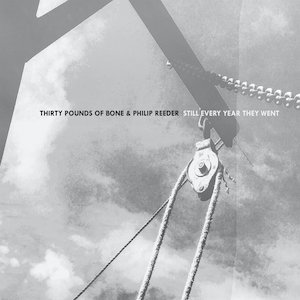 Thirty Pounds of Bone & Philip Reeder – Still Every Year They Went
Thirty Pounds of Bone & Philip Reeder – Still Every Year They Went
Armellodie Records – 29 November 2019
Determined to capture an authentic flavour for their mini-album of traditional fishing/maritime songs, in 2015 Johny Lamb (aka Thirty Pounds of Bone) and Philip Reeder, a fellow university lecturer in popular music as well as musician and producer, boarded the Girl Emily, a 1974 fishing boat sailing out of Custom House Quay in Falmouth, Cornwall, taking with them a guitar, shruti box, two Monotribe synthesisers and assorted microphones, setting up their makeshift recording studio while the skipper and his mate got on with their jobs. The result, variously augmented by the sound of waves, seagulls, a variety of marine life, the boat and coastguard helicopters, is a collection of eight numbers about or from the sea.
It is, as you might imagine, a raw and at times experimental sound, opening with The Farewell Shanty, also known as The Padstow Shanty, a haul away leaving song generally credited to Mervyn Vincent, the vocals buried behind the sound of the waves, wind and a mechanical hum. The eerie background ambience adds extra resonance to The Fisherlad (aka The Fisher Lad of Whitby), the story of a young woman whose fiancé is press-ganged into service aboard a man of war and her dreams of his body lying at the bottom of the sea.
The shortest number at just under two minutes and the first with clearly heard instrumentation is the guitar-accompanied slow waltzing My Bonny Lad, a number first published in 1922 and popularised by Anne Briggs on her 1971 debut, with yet another disconsolate lass whose lover meets a watery grave.
Featuring the sound of gulls, the boat’s creaking hull and the ship bell, The Whaleman’s Lament is a slow, sparse and monotone doomy lament about the 1820-40s Pacific sperm whale fishing, the creaking and lapping waters continuing over into a song of smaller fry with the most familiar of the material, Shoals of Herring, written by Ewan MacColl in 1960 for Singing the Fishing, the third of the eight BBC Radio ballads.
Inevitably, any marine collection worth its (sea) salt has to feature a song about strong drink, thus Farewell To Grog, a song written by Caspar Schenk of the US Navy to mark the ending of its tradition of serving the men a mixture of rum and water as a ration on Sept 1, 1862, the lament first performed the night before in the wardroom of the U.S.S. Portsmouth. The duo give it a duly sober, almost funereal reading, omitting the final “Tomorrow we’ll be sober” of the usually exuberant “Tonight we’ll merry, merry be” chorus.
The penultimate track, again wearied and lugubrious with the waters lapping against the sides, is The Unst Boat Song, collected by John Stickle, a cooper and fiddler from Unst, in the Shetlands, in the early 1900s, its likely origins as an old Shetland or Norse rowing song, a prayer to the sea and God to look after the fishermen, sung, as does Lamb here, in ancient Nora, a long-extinct language once spoken in Shetland, Orkney and Caithness of which this is one of the few surviving examples.
Shruti drone providing the framework and the two voices entwining, it ends, paradoxically, with The Halfway Song, a new, previously unrecorded number written by Brighton folksinger Mary Hampton for a Sussex shanty choir, she and Lamb performing it together when the boat project boat was launched, the returning to shore lyric designed to inspire bone-weary spirits after a gruelling time at sea. By its very nature, both thematically and the minimalist, field-recordings heavy nature of the sound, it is an extraordinarily sounding album with a unique appeal. That said, anyone with an interest in folk music’s shanty and maritime tradition, will also find it fascinating.
Order via Bandcamp here: https://thirtypoundsofbone.armellodie.com/album/still-every-year-they-went
